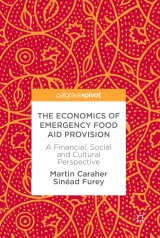Details

The Economics of Emergency Food Aid Provision
A Financial, Social and Cultural Perspective|
64,19 € |
|
| Verlag: | Palgrave Pivot |
| Format: | |
| Veröffentl.: | 26.05.2018 |
| ISBN/EAN: | 9783319785066 |
| Sprache: | englisch |
Dieses eBook enthält ein Wasserzeichen.
Beschreibungen
<p>This short book reviews the provision of food bank and other emergency food aid provision with a specific focus on the UK, whilst drawing lessons from North America, Brazil and Europe. The authors look at the historical positioning of food aid and the growth of the food aid sector in the UK following the period of austerity 2007-2012, before addressing the causes of food insecurity and concluding that food banks are a symptom of austerity and government inaction which fail to tackle the underlying causes of food poverty. The research is timely, and considers a range of disciplines and practices. This book will appeal to researchers, policy makers and practitioners food economics, welfare economics, public policy, public health, food studies, nutrition, and the wider social sciences.</p>
<p>1. The Growing Problems of Food Poverty and Insecurity.- 2. Growth of Food Banks in the UK (and Europe): Leftover Food for Leftover People.- 3. The Cultural and economic Dimensions of Food Poverty.- 4. Food Banks and their Contribution/Detraction from Welfare Budgets.- 5. Conclusion: So What is the Future?<br><br></p><b></b><p></p>
<div><b>Martin Caraher</b> is Professor of Food Policy at City, University of London, UK. He has worked for and acted as a consultant to the UK Dept of Health, the World Bank and the World Health Organisation. He currently acts as an adviser to the European Executive Agency for Health and Consumers (DG Sanco) and is a member of the International Obesity Task Force (IOTF) scientific committee. </div><div> </div><div><br></div><div><b>Sinead Furey</b> is a lecturer in Consumer Management and Food Innovation at the University of Ulster, Northern Ireland. She previously worked in consumer, food and nutrition policy in the Consumer Council for Northern Ireland, Education and Training Inspectorate, and the Food Standards Agency in Northern Ireland. </div><div><br></div>
This short book reviews the provision of food bank and other emergency food aid provision with a specific focus on the UK, whilst drawing lessons from North America, Brazil and Europe. The authors look at the historical positioning of food aid and the growth of the food aid sector in the UK following the period of austerity 2007-2012, before addressing the causes of food insecurity and concluding that food banks are a symptom of austerity and government inaction which fail to tackle the underlying causes of food poverty. The research is timely, and considers a range of disciplines and practices. This book will appeal to researchers, policy makers and practitioners food economics, welfare economics, public policy, public health, food studies, nutrition, and the wider social sciences.
Addresses the economics of food poverty in the larger realm of the welfare state Locates food banks as 'successful failures', and considers what this means for society Proposes that charity and the use of waste/surplus is not the answer to food poverty
- Addresses the economics of food poverty in the larger realm of the welfare state<div><br><div>- Locates food banks as 'successful failures', and considers what this means for society</div><div><br></div><div><div>- Proposes that charity and the use of waste/surplus is not the answer to food poverty</div></div></div><div><br></div>
“In 2014/15, the average income in Northern Ireland was 24% less than that of England. In addition, the proportion of the population claiming Disability Allowance, or Personal Independence Payments, in Northern Ireland is double that of the UK average. This lower income means that households in Northern Ireland spend a larger proportion of their household expenditure on essential goods, when compared to their GB counterparts. This work by Martin and Sinéad, provides further evidence of this squeeze, and the importance of looking at other, more permanent, solutions than Food Banks to support struggling households.” (John French, Chief Executive Officer, Consumer Council for Northern Ireland)
Diese Produkte könnten Sie auch interessieren:

Mapping Sustainability

von: Nazli Choucri, Dinsha Mistree, Farnaz Haghseta, Toufic Mezher, Wallace R. Baker, Carlos I. Ortiz

96,29 €

Fertility, Living Arrangements, Care and Mobility

von: John Stillwell, Ernestina Coast, Dylan Kneale

96,29 €














